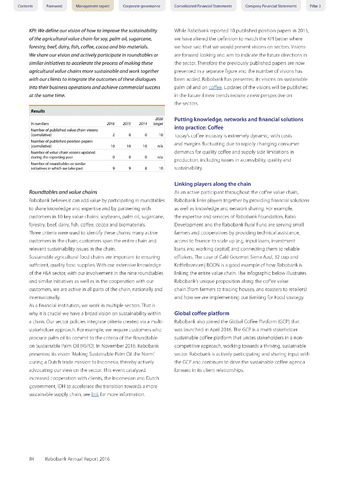Contents Foreword Management report Corporate governance
Consolidated Financial Statements
Company Financial Statements
Pillar 3
KPI: We define our vision of how to improve the sustainability
of the agricultural value chain for soy, palm oil, sugarcane,
forestry, beef, dairy, fish, coffee, cocoa and bio-materials.
We share our vision and actively participate in roundtables or
similar initiatives to accelerate the process of making these
agricultural value chains more sustainable and work together
with our clients to integrate the outcomes of these dialogues
into their business operations and achieve commercial success
at the same time.
Results
In numbers
2016
2015
2014
2020
target
Number of published value chain visions
(cumulative)
2
0
0
10
Number of published position papers
(cumulative)
10
10
10
n/a
Number of value chain visions updated
during the reporting year
0
0
0
n/a
Number of roundtables or similar
initiatives in which we take part
9
9
8
10
Roundtables and value chains
Rabobank believes it can add value by participating in roundtables
to share knowledge and expertise and by partnering with
customers in 10 key value chains: soybeans, palm oil, sugarcane,
forestry, beef, dairy, fish, coffee, cocoa and biomaterials.
Three criteria were used to identify these chains: many active
customers in the chain; customers span the entire chain and
relevant sustainability issues in the chain.
Sustainable agricultural food chains are important to ensuring
sufficient, quality food supplies. With our extensive knowledge
of the F&A sector, with our involvement in the nine roundtables
and similar initiatives as well as in the cooperation with our
customers, we are active in all parts of the chain, nationally and
internationally.
As a financial institution, we work in multiple sectors. That is
why it is crucial we have a broad vision on sustainability within
a chain. Our sector policies integrate criteria created via a multi-
stakeholder approach. For example, we require customers who
produce palm oil to commit to the criteria of the Roundtable
on Sustainable Palm Oil (RSPO). In November 2016, Rabobank
presented its vision 'Making Sustainable Palm Oil the Norm'
during a Dutch trade mission to Indonesia, thereby actively
advocating our view on the sector. This event catalysed
increased cooperation with clients, the Indonesian and Dutch
government, IDH to accelerate the transition towards a more
sustainable supply chain, see link for more information.
While Rabobank reported 10 published position papers in 2015,
we have altered the definition to match the KPI better where
we have said that we would present visions on sectors. Visions
are forward looking and aim to indicate the future directions in
the sector. Therefore the previously published papers are now
presented in a separate figure and the number of visions has
been added. Rabobank has presented its visions on sustainable
palm oil and on coffee. Updates of the visions will be published
in the future if new trends require a new perspective on
the sectors.
Putting knowledge, networks and financial solutions
into practice: Coffee
Today's coffee industry is extremely dynamic, with costs
and margins fluctuating due to rapidly changing consumer
demands for quality coffee and supply side limitations in
production, including issues in accessibility, quality and
sustainability.
Linking players along the chain
As an active participant throughout the coffee value chain,
Rabobank links players together by providing financial solutions
as well as knowledge and network sharing. For example,
the expertise and services of Rabobank Foundation, Rabo
Development and the Rabobank Rural Fund are serving small
farmers and cooperatives by providing technical assistance,
access to finance to scale up (e.g. input loans, investment
loans and working capital) and connecting them to reliable
offtakers. The case of Café Gourmet Sierra Azul, 32 cup and
Koffiebranderij BOON is a good example of how Rabobank is
linking the entire value chain. The infographic below illustrates
Rabobank's unique proposition along the coffee value
chain (from farmers to trading houses, and roasters to retailers)
and how we are implementing our Banking for Food strategy.
Global coffee platform
Rabobank also joined the Global Coffee Platform (GCP) that
was launched in April 2016. The GCP is a multi-stakeholder
sustainable coffee platform that unites stakeholders in a non
competitive approach, working towards a thriving, sustainable
sector. Rabobank is actively participating and sharing input with
the GCP and continues to drive the sustainable coffee agenda
forward in its client relationships.
84 Rabobank Annual Report 2016

